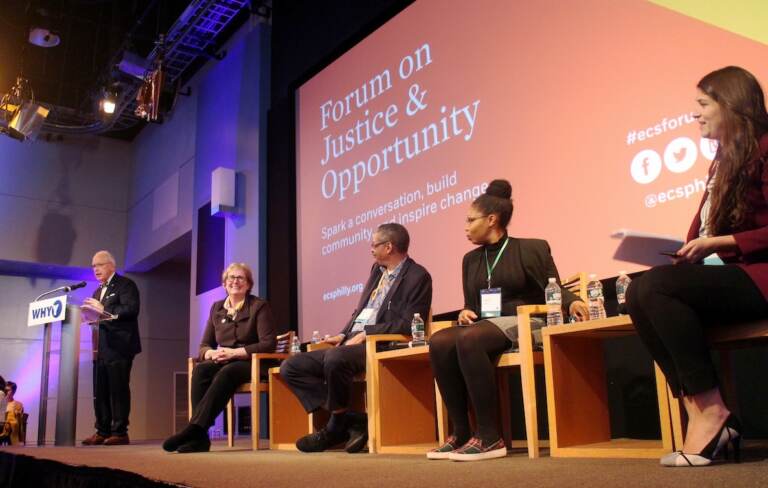Episcopal Community Services hosts free forum on racial equity, ending poverty
Episcopal Community Services is a grassroots Philadelphia organization that has been involved in the fight against poverty in the region for decades.
Listen 5:54
Photo taken at one of ECSPhilly’s past annual forums on Justice and Opportunity. This year’s virtual event will be their 8th annual forum. (ECS Philly)
The government aid spurred by the pandemic has helped to cut poverty in half according to a new report from the New York Times, but the aid to families was only temporary. How do you eliminate poverty?
Episcopal Community Services is a grassroots organization based in the Philadelphia region that has been involved in the fight against poverty in the region for decades. Victoria Bennett is the nonprofit’s chief inclusion and advocacy officer. She sat down with WHYY Host Cherri Gregg to discuss their new policy focus.
—
The New York Times has reported that poverty has actually fallen thanks to aid programs brought on because of the pandemic. What has changed about the way that people look at poverty? And how has the pandemic helped that change happen?
Victoria Bennett (VB): We are braver now. We have to bear witness to what has always happened. We have to take the responsibility, as organizations and civic leaders, and counsel folk to say that we have to come together to make a change. It’s not the fault of the people who are suffering.
I want to hone in on the three areas that ECS focuses on. What are they?
VB: And I want to just say that for generations, Episcopal Community Services has offered direct services to people experiencing poverty, and we’ve done that with provision, skill, dignity, and compassion. But a few years ago, we realized that that really wasn’t enough. So as part of our advocacy efforts, we really took a look at what do we think are the root causes of poverty. Because I think for a while, what people tended to do is deal with the symptoms of poverty. But we wanted to go deeper, and the root causes that we feel like we want to champion are things around racial equity and racial equality, a living wage, and also ending called the benefits cliff. So we start with racial equity and really, to me, that’s the overarching big issue that all the other problems really fall within. Then you think about, OK, living wage: We have people working two, three, or sometimes even four jobs. People should not be working two or three or four jobs and still [not be able to] take care of themselves. And then also, we want to end this dynamic that happens around the benefits cliff. When there’s just a slight increase in your income, you can lose child care or you can lose your food support. That really incentivizes people to turn down raises or to turn down a job. So we figure and we feel like those three areas are areas that we really want to champion. We think they are critical to eradicating the state of poverty that we know has been horrific and horrifying to individuals and families and particularly in our communities.
I want you to expound on the issue of race and poverty. How does race play into it?
VB: Well, I think race plays into it directly. There are some people who get the benefits, and there are some people who don’t get the benefits. I think it’s something that we have always known, but it’s been a really, really sensitive issue that people have not really wanted to face. And as a result of the past two years, I guess with the racial reckoning that happened and with the unfortunate, horrific death of George Floyd, the curtains have been drawn back. People can now see that unfortunately, the color of your skin, your economic status, the particular ZIP code in which you live really impacts the resources that are given to you. And you know, that’s why we are really looking at this term “equity.” It should be a balanced distribution of resources and goods and services, [but] that distribution is imbalanced. We want to bring balance to that for communities of color and communities that are vulnerable and people who are Black and poor.
ECS has a big forum coming up that will further explain these areas and hopefully rally people around that. Tell me about this upcoming symposium.
VB: Well, this upcoming forum, I’m just like really excited about it. I mean, it’s going to be a terrific, powerful gathering of thought leaders and community-builders, people who are on the front lines, who are doing this work. We have Charles Blow of the New York Times, he’s going to be our keynote speaker and we know he’s a powerful voice for racial equity, particularly right now. He’s going to actually help us kick the session off on Monday at noon. And then every day, for five days, you can join us for this virtual conversation around the three key issues: racial equity, living wage, and the benefits cliff.
As you’re out here and fighting and advocating on behalf of this topic, what is one of the biggest misconceptions?
VB: I think one of the biggest misconceptions is that people choose to live this way: that people are lazy, that people just want to accept public benefits. That’s really not true. This is a horrible situation to be caring for your loved ones and your families and striving to raise children and knowing every single day that you don’t have enough resources to take care of your basic needs. Just talk to someone who is actually living this out every day, and I think people will really get a better understanding. And that’s what we hope to do with this forum. We will have participant voices, wonderful people in Philadelphia, some powerhouse individuals who have stepped up and provided leadership in this space, and we are hoping to build a movement around this.
Check out Episcopal Community Services free Forum on Justice and Opportunity kicks off October 18. For details: https://ecsphilly.org/news-events/forum2021/.

Get daily updates from WHYY News!
WHYY is your source for fact-based, in-depth journalism and information. As a nonprofit organization, we rely on financial support from readers like you. Please give today.







